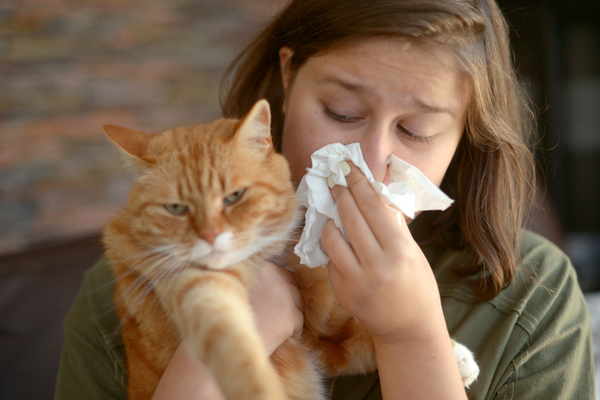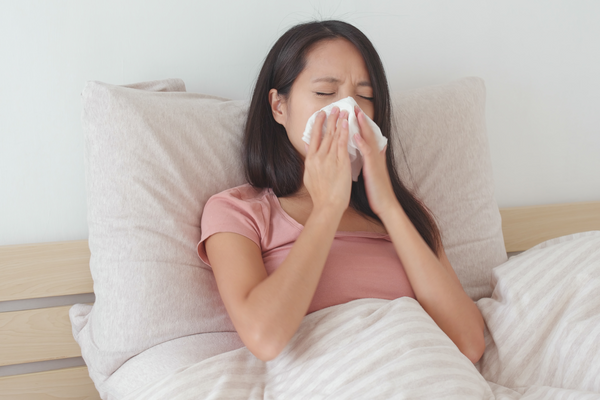What is Infant Eczema? Atopic Dermatitis and Contact Dermatitis in Babies

Does your baby have patches of inflamed, dry, red, itchy skin? There’s a good chance it could be infant eczema. While this common skin condition is not contagious, it can cause a lot of discomfort for your baby and sleepless nights for both of you. Read on to learn more about infant eczema and how best to combat it.
What is Infant Eczema?
Infant eczema is generally used as an umbrella term to describe two non-contagious, inflammatory skin conditions:
- Atopic dermatitis (AD)
Atopic dermatitis is typically an inherited, chronic condition that is more common among infants with a family history of allergies, asthma, and eczema. According to the National Eczema Association, about 13% of all children in the U.S. have atopic dermatitis.
- Contact dermatitis
Contact dermatitis is skin irritation, or a rash, that develops when the skin comes into contact with an irritating substance. Once the irritant is eliminated, the rash usually clears.
Babies are more prone to eczema because their skin barrier is still developing and is more fragile than an adult’s, leading to dry skin and enhanced absorption of irritants and allergens into the skin. To remedy the discomfort, babies will often scratch their skin, or rub their skin against surfaces, to get rid of the itch. The constant scratching irritates the skin and results in inflammation and rashes.
While many children outgrow eczema, for some, the condition might last into adolescence or adulthood. The American Academy of Dermatology estimates that eczema affects up to 25% of children globally and that about 60% of people with eczema develop it during their first year of life. Itching, dryness, and redness are all common symptoms of eczema. Eczema rashes can appear all over the body or in just a few spots. The rashes can worsen at certain times (this is called a “flare-up”) and be so itchy and uncomfortable that they interfere with sleep, bathtime, playtime, and regular day-to-day life, making your baby (and you!) miserable.
While there is no cure for atopic dermatitis, most cases can be managed with custom skincare plans (including moisturizers and prescription medications) and strategies to avoid triggers.
If you notice that your baby’s skin is irritated, or if you have questions about how to care for your baby’s eczema, consult with your child’s pediatrician, allergist, or dermatologist.
Atopic Dermatitis, Asthma, and Allergies
Atopic dermatitis is part of a group of allergic conditions. In fact, “atopic” means allergy. These include asthma, allergies (also called hay fever), and food allergies. If an infant has one of these conditions, the likelihood of developing another atopic condition is increased. Contact dermatitis is also considered atopic, though its connection to asthma and allergies is still unknown.
Avoiding Infant Eczema Triggers
One of the most effective ways of controlling infant eczema is to identify what triggers your baby’s eczema flare-ups and avoid them as much as possible. Everyday culprits can cause your infant’s eczema to appear or worsen suddenly. According to the American Academy of Dermatology, these are some common triggers for childhood eczema:
Indoor Allergens
Infants (and adults) with eczema may have allergies to environmental factors or allergens like pet dander, dust mites, mold, and pollen that can cause eczema flare-ups. Fortunately, there are several ways to reduce allergens inside of your home, including:
- Vacuuming regularly with a HEPA-type vacuum.
- Bathing pets regularly with The Ecology Works Anti-Allergen Pet Shampoo to remove allergens from their fur.
- Frequently dusting surfaces around the home with a microfiber cloth dampened with The Ecology Works Anti-Allergen Solution. This gentle, 100% biodegradable solution can also be used to neutralize common indoor allergens on furniture, bedding, carpets, rugs, upholstery, pet beds, and more.
- Washing baby’s laundry and other household washables (including washable rugs, linens, towels, and more) with The Ecology Works Anti-Allergen Laundry Detergent. This hypoallergenic detergent is tough on stains and allergens while leaving nothing behind to irritate sensitive skin.
Bodily Triggers (from milk, saliva, or sweat)
Experts recommend dressing your baby in lightweight cotton clothing and being mindful of any bodily triggers. For example, if you notice that your baby’s saliva is triggering eczema on the face, gently pat away drool when you see it and apply plain petroleum jelly around your baby’s mouth before feedings and naps.
Laundry Detergents & Softeners
Harsh laundry detergents and fabric softeners are a common cause of eczema in babies. Consider using a gentle, hypoallergenic detergent when washing baby’s clothes and crib sheets. The Ecology Works Anti-Allergen Laundry Detergent leaves babies’ clothes feeling soft and cozy–no additional fabric softener required. Plus, its gentle cleansing action removes common indoor allergens from household washables. Our detergent is recommended by allergists and dermatologists and is gentle enough for delicate, sensitive skin.
Related: Is Just-For-Baby Laundry Detergent Necessary?
Baby Care Products
Baby powder, wipes, soaps, shampoos, lotions, oh my! There are so many baby products out there that are loaded with irritants, such as fragrance chemicals, that can cause flare-ups in eczema-prone children and adults. When stocking up on products for your baby, try sticking to products that are free and clear of unnecessary ingredients, especially perfumes or fragrances.
Cleaning Products
Household cleaning products and sprays, whether in liquid form or as airborne particles (such as air fresheners), can irritate the skin of people with eczema. And while, as parents, we all do our best to keep our children away from cleaning products, the fact that infants spend a great deal of their time exploring and crawling around the floor means that they are inadvertently exposed to harsh household cleaners. That said, children with eczema are more prone to skin infections, as eczema makes it easier for bacteria and viruses to get inside the body, so it’s especially important to keep a clean household environment.
Our multi-purpose household cleaner and disinfectant product, Vital Oxide, is free from harsh chemicals, is gentle for everyday use in the home, and is mild enough to use around babies and pets. Vital Oxide does an excellent job cleaning and leaves no harmful chemical residue behind; use it to clean your floors, baby’s bathtub, baby’s nursery, the smelly diaper pail, and more.
Dry Air
Cold, dry outdoor air and indoor heating can rob the skin of its natural moisture in the winter. Running a cool-mist humidifier in your baby's bedroom can help keep her skin super-hydrated. Clean and disinfect the humidifier frequently with Vital Oxide to prevent bacteria and mold buildup.
Have questions about laundry, cleaning, or reducing allergens inside your home or business? We have answers! The Ecology Works has been helping folks with allergies and asthma since 1993. We can help you select the products you need to live a better, allergen-free life. Please feel free to Contact Us or message us on Facebook. No question is too small! We're here to help.




